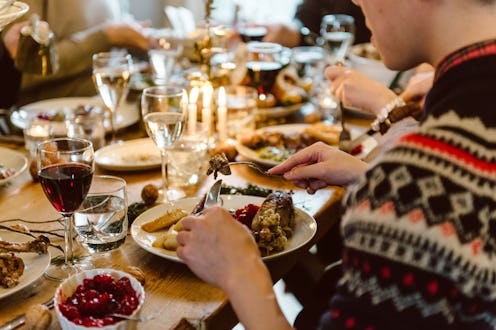Life
Here's Why It's SO Important To Fight An Afternoon Snooze After Your Christmas Lunch

If there is one day of the year where your dietary plans are completely pushed aside, it's Christmas Day. While I'm sure you throughly enjoy the variety of foodstuffs and the delicious flavours hitting your tastebuds — I totally concur — a big meal such as this can totally wreak havoc with your sleeping habits. From heartburn to acid reflux, many of us will be asking how to sleep after a big meal when Christmas Day comes to an end. That and what's leftover, but that dilemma can wait until Boxing Day.
It's a pretty well-known fact that eating a big meal can make you feel tired, as the Huffington Post reports, tricking your brain into believing a little nap won't do you any harm. One of the reasons that this occurs is because of low blood pressure which, according to WebMD, happens if a meal contains a high amount of carbohydrates and, well, a lot of servings. This, with the addition of glucose overload, can make taking a nap incredibly disruptive to your digestive system.
And while some Christmas staples like turkey and pork contain high levels of tryptophan, "a substance that is metabolised by our bodies into serotonin and melatonin, sleep-inducing agents," as Very Well Health pointed out, drinking substances such as alcohol and soda can counteract this and keep you wide eyed until the early hours. Moreover, there's even a stroke connection. As LiveStrong reports, based on a study by the University of Ioannina Medical School in Greece, "those who waited the longest between eating and sleeping were at the lowest risk for stroke."
But if it's detrimental to your sleep to doze off after a big meal, when should you go to bed? According to New Health Advisor, it's best to wait at least two hours, as "if you've developed a habit of lying down soon after you eat your food, you may eventually develop gastro-esopheageal reflux disease (GERD)." That's a worst case scenario, but it's certainly something that you do not want to develop. Either way, best to remember, as the Sleep Judge report, that digestion is best handled in an upright position.
Nocturnal heartburn, indigestion, and acid reflux can also be a side-effect of going to sleep too quickly after a heavy meal, which can easily be prevented by waiting the recommended time period, taking medication such as antacids to counteract and neutralise your stomach acids, and sleeping in a much more beneficial position.
According to Sleep.org, "sleeping on your right side can cause heartburn symptoms to flare," whereas "sleeping on your left [...] may ease the discomfort, possibly because it helps to relax the lower esophageal sphincter, which is located between your stomach and esophagus."
Lying down in an elevated position can also help, which can be achieved by "rais[ing] the head of your bed" or by using "a foam wedge to keep your body slightly upright from the waist up." As someone who often suffers with heartburn and indigestion, I often end up using a V-shaped pillow like this to prop myself up in bed while I sleep and it works wonders.
All in all, enjoying Christmas dinner and having a well-rested sleep can go hand in hand, as long as you're aware of what you're eating, how much of it you're consuming, and when you decide to hit the hay.